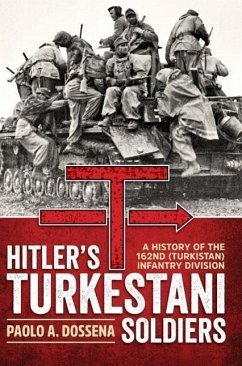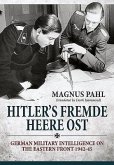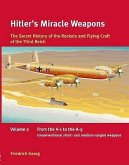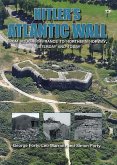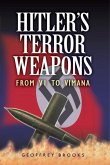This is the story of the 162nd (Turkistan) Infantry Division, a World War II German division composed of Central Asian Turkistanis. The book covers the political background (pan-Turkism) of the founders of this unit in German service, debunks some historical myths surrounding it (the 'Nazi Mysteries') and focuses on the most crucial events in the history of the division, the Gottschee battle (Slovenia) and the 'great winter mopping up' (northern Italy). Pan-Turkish activists were prime movers in organizing Turkistani military units in German uniform. These men were completely unrelated to the occultist/esoteric beliefs, followed by some top Nazi leaders such as Heinrich Himmler or Alfred Rosenberg. The Pan-Turkish activists recruited the soldiers from Soviet POWs in Hitler's hands. Not all of the former prisoners were volunteers, some were forced to join, while a huge number of Soviet soldiers enlisted in order to survive German captivity (where a large number of their comrades had died because of ill treatment or starvation.) Another huge problem was that Pan-Turkism is something different from Kemalism (Turkish-Anatolian secular and Jacobin nationalism), the former being the political movement aiming at the political union of all Turkic-speaking populations. This is why the German ambassador to Ankara reported that he thought that the Turkish Government might even be embarrassed by open Pan-Turk propaganda from Berlin. Despite this, four main Turkish or partially Turkish units in German uniform were formed. These units were part of the 'Eastern Troops', whose Soviet personnel (Baltics, Slavs, Caucasians, Turkmen etc) were integrated into the German forces. It seems that the largest formation of the Eastern Troops in German service was the 162nd (Turkistan) Infantry Division. The most crucial event in the history of this formation was the 'great winter mopping up' (November 1944-January 1945). This operation (the clearing of Italian partisan independent republics which had been set up in the Northern Apennine mountains) was the greatest German anti-partisan action in Western Europe and one of the greatest anti-partisan operations of World War II. The author undertook a massive field investigation to determine what happened in the mountains. He reached the conclusion that the Turkistani soldiers were victims twice over: as Easterners they were regarded as inferior beings by their Nazi masters, as non-Communists, they were regarded as traitors by the Allies. All of this explains why the life and the fate of these Turkmen was absolutely tragic. The author presents a detailed textual history accompanied by over 200 rare photographs, including a large number that are previously unpublished.
Hinweis: Dieser Artikel kann nur an eine deutsche Lieferadresse ausgeliefert werden.
Hinweis: Dieser Artikel kann nur an eine deutsche Lieferadresse ausgeliefert werden.

